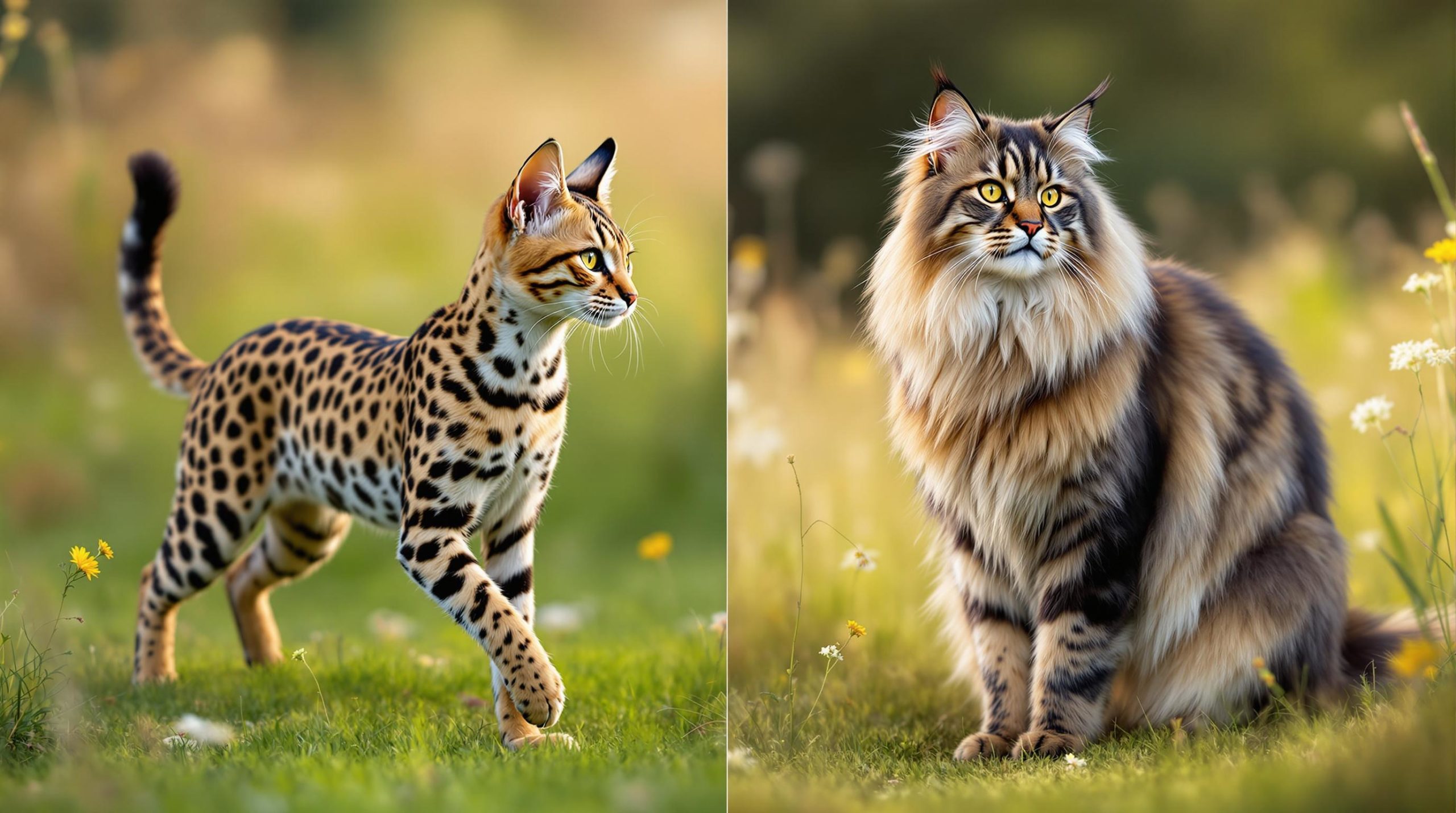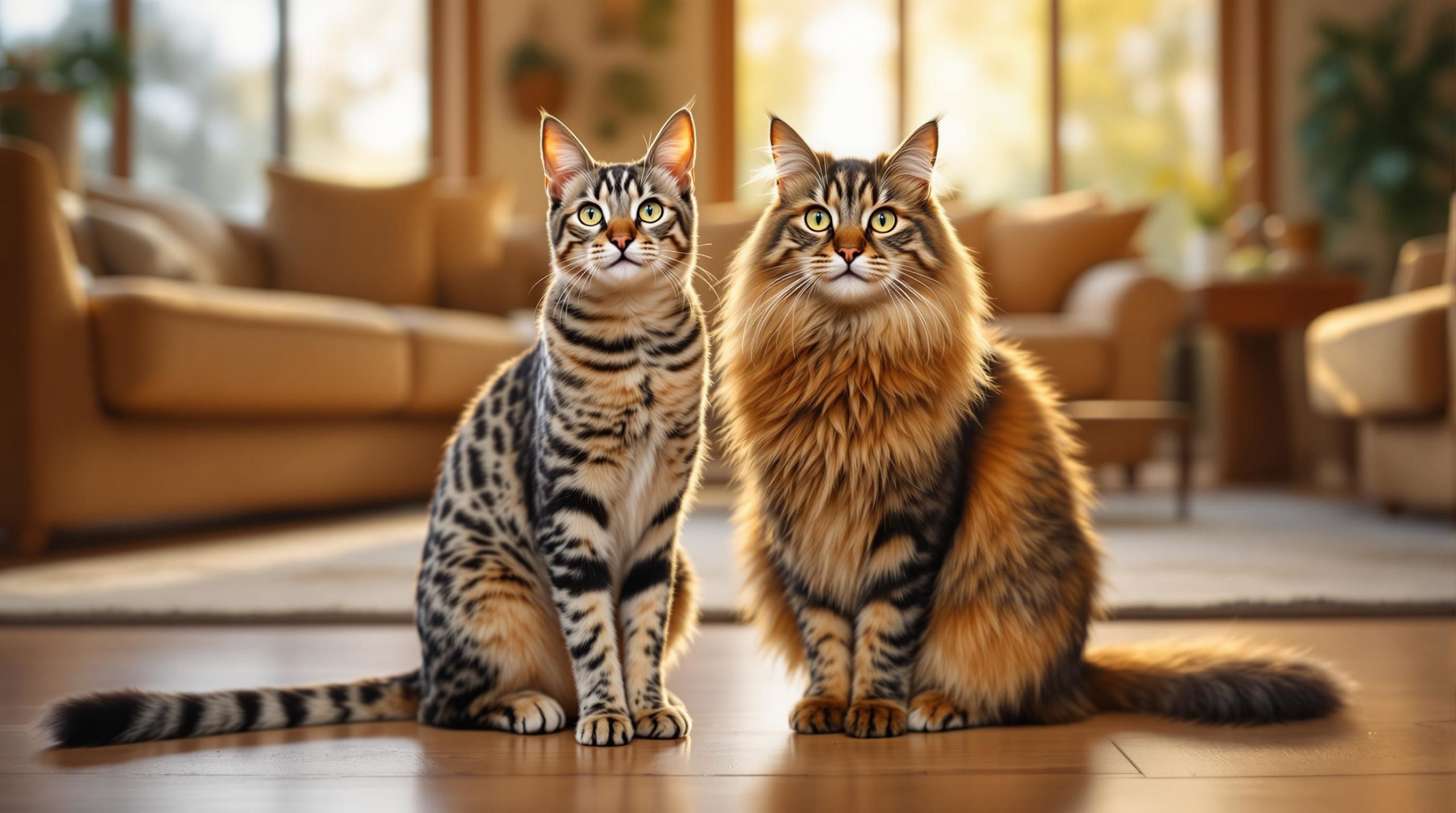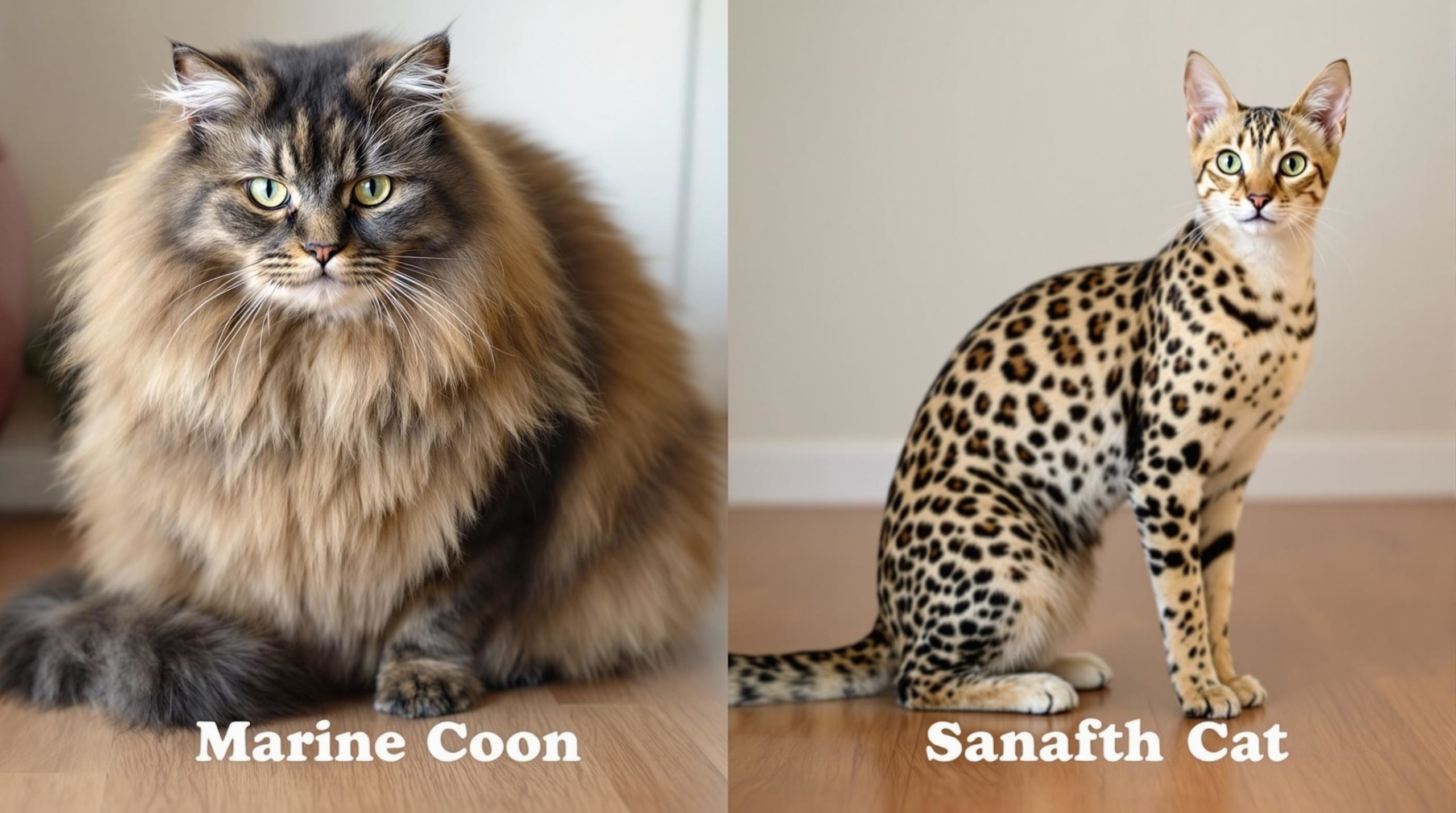A comparison between the savannah cat and the maine coon

Choosing between the Savannah cat and the Maine Coon is like deciding between a wild safari adventure and a cozy countryside retreat. Each breed brings a unique blend of charm, personality, and care requirements that make them stand out in the feline world. Whether it’s the exotic allure of the Savannah or the friendly giant nature of the Maine Coon, these cats captivate pet lovers with their distinctive qualities and enchanting presence.
Exploring Origins and Ancestry: Savannah Cats Versus Maine Coons
The roots of a cat breed often shape its characteristics and temperament, and nowhere is this clearer than in the Savannah cat versus the Maine Coon. Both breeds bring impressive histories to the table, but with very different paths to domestic life.
The Savannah cat is a relatively recent creation, first bred in the 1980s. This exotic breed began with the intentional crossing of a domestic cat — often a Bengal or Egyptian Mau — with a wild African serval. This hybrid origin infuses Savannah cats with their captivating appearance: tall, slender frames, spotted coats, and large ears, all echoing their untamed ancestors. Their wild heritage also grants them notable athleticism and heightened curiosity, making them energetic companions, often curious and adventurous.
In contrast, the Maine Coon has roots tracing back centuries, naturally evolving in the cold, rugged landscapes of Maine. The breed likely descended from longhaired cats brought by seafarers during the 1700s. Over time, natural selection favored large, muscular cats with thick, insulating coats that could withstand harsh winters. This evolution gave birth to the gentle giants of the domestic cat world, known for their rugged appearance and warm, affectionate nature.
- Savannah Cats — Hybrid breed from African serval and domestic cats; developed in the 1980s.
- Maine Coons — Natural breed from Maine; evolved over centuries since the 1700s.
- Impact of Origins: Savannahs display wild athleticism, while Maine Coons show adaptation for cold climate resilience.
| Breed | Origin | Historical Background | Breed Type |
|---|---|---|---|
| Savannah Cat | Africa / USA | Hybrid cross of African serval with domestic cats in 1980s | Hybrid |
| Maine Coon | Maine, USA | Natural breed, evolved from seafarers’ imported cats since 1700s | Natural |
The heritage of the Savannah cat’s wild ancestors means prospective owners should consider their strong predatory instincts and energetic behaviors. Meanwhile, the Maine Coon’s origins in rugged northern climates endow them with a rugged coat but a more sociable, family-friendly demeanor. It’s also worth noting how breeds like Maine Coons have deeper recognition from institutions such as the Cat Fanciers’ Association, which helps preserve their lineage compared to the relatively young Savannah Cat Club and its breeders.

Size, Body Shape, and Distinct Physical Traits of Savannah Cat and Maine Coon
When comparing the Savannah cat and Maine Coon, their size and body shapes reveal key differences beyond their shared large stature. Understanding these physical traits helps to appreciate how each breed fits different lifestyles and environments.
The Maine Coon is renowned as one of the largest domestic cat breeds. They boast a muscular, rectangular body shape with broad chests and strong, sturdy limbs. Males typically weigh between 18 to 21 pounds, while females range from 12 to 15 pounds. Their average length, measured nose-to-tail, can reach around 40 inches, and their shoulder height spans 10 to 16 inches. This big-bodied feline pairs its large frame with a thick, shaggy coat that gives it a majestic silhouette.
On the other hand, Savannah cats have a more lithe and leggy build. With disproportionately long legs and necks relative to their slim, agile bodies, they stand out in height and reach. Early generation Savannahs, particularly the F1 and F2 hybrids, often exceed 20 pounds, while subsequent generations tend to weigh between 12 and 18 pounds. Their body is sleek, complemented by large ears that add to their exotic appearance. Savannahs can stretch up to 44 inches or more in length, taking advantage of their elongated limbs and necks to give an almost towering presence compared to other cats.
- Maine Coon: Muscular, chunky frame; large paws; broad chest.
- Savannah: Tall, slender, and leggy; elongated neck; very large ears.
- Weight Range: Maine Coons (12-21 lbs), Savannahs (12-25+ lbs depending on generation).
- Length: Maine Coons ~40 inches; Savannahs up to 44 inches or taller.
| Characteristics | Maine Coon | Savannah Cat |
|---|---|---|
| Body Type | Muscular and rectangular | Lithe, long-legged |
| Weight – Male | 18-21 lbs | 20+ lbs (F1-F2), 12-18 lbs (later) |
| Weight – Female | 12-15 lbs | 12-18 lbs |
| Length (Nose to Tail) | Up to 40 inches | Up to 44 inches |
| Height at Shoulder | 10-16 inches | Often taller due to long legs |
This size and structure difference hints at varying activity and space needs. The muscular Maine Coon is sturdy and robust, thriving with climbing and jumping on substantial cat trees like those found at the Maine Coon Boutique. Savannah cats require room to stretch and roam vertically, making devices from the Savannah Cat Shop essential for their enrichment.
Training and honoring these physical traits is part of building a rewarding relationship with your chosen breed.
Grooming Requirements, Coat Types, and Color Variations
Careful attention to coats often distinguishes the experience of owning a Maine Coon versus a Savannah cat. Not only do their coats differ, but their grooming demands and adaptability to climate are significant considerations.
The Maine Coon sports a thick, luxurious double coat that serves as natural insulation against cold. It’s water-repellent, with long fur that’s especially abundant around the neck, chest, and underbelly. The complexity of such a coat requires regular maintenance—brushing at least two to three times per week helps prevent tangles, mats, and reduces shedding.
Maine Coons display a vast range of colors and patterns, dominated by brown tabby shades but including options such as:
- Silver
- Red
- Cream
- Blue
- Bi-color variants
In contrast, Savannah Cats have comparatively short, dense coats with minimal shedding. Their patterning often includes striking spots or classic tabby markings, predominantly in these colors:
- Brown spotted tabby
- Silver tabby
Because their coats are less demanding, Savannah cats only require occasional brushing to maintain shine and skin health.
A cool environment suits Maine Coons best, given their thick coats, while Savannah Cats are better adapted to warmer homes. This difference ties into their natural origins and affects home temperature preferences for optimal comfort.
| Feature | Maine Coon | Savannah Cat |
|---|---|---|
| Coat Type | Thick, insulating double coat, water-repellent | Short, dense, low-shedding |
| Colors | Brown tabby, silver, red, cream, blue, bi-color | Brown spotted tabby, silver tabby |
| Grooming Frequency | 2-3 times per week brushing | Occasional brushing |
| Ideal Home Temperature | Cooler environments | Warmer environments |
When considering an online resource for maintenance tips, enthusiasts often turn to communities like Maine Coon World or browse the latest from Savannah Pet Supplies for specialized grooming tools tailored to their exotic coats.

Temperament Traits and Social Behavior: Comparing Personality Profiles
The charm of cats often lies in their personality, and both Maine Coon and Savannah cat offer engaging but very different temperaments that will appeal to varying pet owners.
Maine Coons earn the nickname “gentle giants” for good reason. They combine a friendly, affectionate nature with a calm disposition. These cats are social, easygoing, and integrate well with children and other pets alike. Their distinct vocalizations — soft chirps, trills, and meows — express warmth and maintain ongoing communication with their owners. You’ll often find them following their favorite humans around, eager for interaction but not overly demanding.
Savannah cats showcase a high-energy, adventurous personality infused with wild instincts from their serval ancestors. Particularly in early generations (F1 to F3), they display remarkable intelligence and curiosity, often learning tricks, leash walking, and responding to commands much like a dog. Their strong prey drive and boundless energy require owners to provide stimulation and safe outlets for exploration to prevent boredom.
- Maine Coon: Affectionate, gentle, social, good with families and pets.
- Savannah Cat: Energetic, highly intelligent, curious, somewhat wild instincts.
- Communication Style: Maine Coons use soft chirps; Savannahs exhibit dynamic vocalizations.
- Exercise Needs: Moderate for Maine Coon; high for Savannah cat.
| Trait | Maine Coon | Savannah Cat |
|---|---|---|
| Temperament | Gentle giant, family friendly | Active, curious, adventurous |
| Social Behavior | Enjoys company, calm interplay with pets | Highly social but needs engagement and stimulation |
| Vocalization | Soft chirps, trills, gentle meows | Wide range: meows, chirps, yowls |
| Prey Drive | Low to moderate | High, especially in early-generation hybrids |
Choosing between these personalities boils down to lifestyle fit. For families and novices, Maine Coons from Maine Coon Co. breeders offer reliability and loving companionship. Savvy owners eager to work with a challenging, intelligent feline often turn to Savannah Breeders recognized by the Savannah Cat Club to find the right match with their active preferences.
Health, Lifespan, and Lifestyle Needs for Savage Cats and Maine Coons
The long-term care and wellbeing of any cat depend heavily on understanding breed-specific health issues and lifestyle adaptations.
Maine Coons boast an average lifespan of 12 to 15 years but require careful monitoring for genetic concerns like hypertrophic cardiomyopathy (HCM) and hip dysplasia. Regular veterinary checkups and screenings are crucial. Additionally, owners should be aware of joint health challenges common to this hefty breed—knowledge easily found through resources like Maine Coon hypallergenic guides and Maine Coon World insights on breed specifics.
Savannah cats may live longer, ranging from 12 to 20 years, but early-generation hybrids can be prone to heart issues such as HCM and progressive retinal atrophy. Some individuals might also face digestive or liver concerns. Their hybrid genetics provoke the need for specialized veterinary oversight and possibly genetic testing. A consulting visit to a specialized Savannah Cat Rescue or support groups can be invaluable for prospective owners.
- Maine Coons: Lifespan 12-15 years; monitor HCM, hip dysplasia.
- Savannah Cats: Lifespan 12-20 years; check heart, eye, liver health.
- Healthcare Tips: Regular screenings and breed-specific vet visits crucial.
- Lifestyle: Maine Coons adapt well indoors with engaging play; Savannah cats need secure outdoor spaces or catios.
| Health Factor | Maine Coon | Savannah Cat |
|---|---|---|
| Average Lifespan | 12-15 years | 12-20 years |
| Common Health Issues | Hypertrophic cardiomyopathy (HCM), hip dysplasia | HCM, progressive retinal atrophy, digestive/liver issues |
| Recommended Care | Regular heart & joint checks | Specialized vet monitoring and genetic testing |
| Lifestyle Requirements | Indoor enriched environment or supervised outdoor access | Needs vertical space, enrichment toys, secure catio or outdoors |
In terms of living environments, Maine Coons easily acclimate to apartments or large homes alike, enjoying the occasional outdoor experiences on leashes or safely enclosed yards. Savannah cats demand more space and stimulation due to their high energy, and many owners build “catios” to accommodate their natural curiosity without compromising safety. For additional guidance, exploring offerings from Coon Cat Castle for Maine Coons and Savannah Cat Rescue advice could be essential.
FAQ: Savannah Cat and Maine Coon Comparison
- Q: Are Maine Coons or Savannah cats better for first-time cat owners?
A: Maine Coons are generally more adaptable and easier for first-time owners, thanks to their gentle temperament and lower activity level. Savannah cats, especially early-generation hybrids, need experienced owners due to their high energy and complex care.
- Q: How much space do Savannah cats need compared to Maine Coons?
A: Savannah cats require more vertical space and enrichment to satisfy their active nature, while Maine Coons are more flexible and adapt well to various home sizes.
- Q: Do Savannah cats shed less than Maine Coons?
A: Yes, Savannah cats have a short, low-shedding coat requiring less grooming, whereas Maine Coons shed more and need regular brushing to prevent mats.
- Q: Are Savannah cats legal everywhere?
A: No. Some regions restrict ownership of certain Savannah generations due to their wild heritage; always check local laws and breed regulations before acquiring one.
- Q: Where can I find reputable breeders or care resources for these breeds?
Look for trusted Maine Coon breeders often recognized by organizations like Maine Coon Co., and Savannah cat breeders affiliated with the Savannah Cat Club. Online resources such as Maine Coon World and Savannah Cat Shop offer helpful information and products for owners.